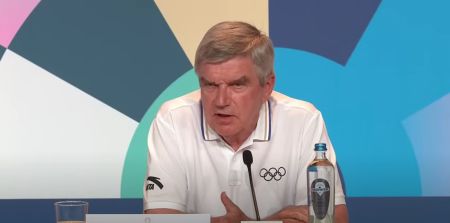IOC president plans to step down, won't seek reelection after Paris Games

International Olympic Committee President Thomas Bach says he will not seek another term after over a decade in office.
At a press conference Saturday, the 70-year-old lawyer and German fencing gold medalist announced he would not seek to have his term extended beyond "the term limit stipulated by the Olympic Charter."
The Olympic Charter declares that the president may serve "for a term of eight years renewable once for four years." Bach has served as president of the International Olympic Committee since 2013.
"During and even more since our last Session in Mumbai 2023, so many of you have asked me to have my mandate extended and to agree with a change of the Olympic Charter for this purpose," he said.
"I was one of the promoters and authors of such a term limit at the time of the revision of the Olympic Charter," he said. "I strongly believe that after 12 years in the office as IOC President, our organization is best served with a change in leadership."
Bach urged the IOC to "respect that I'm deeply convinced this to be in the best interest of our beloved Olympic movement."
He called the committee to "schedule the election for March 2025" to ensure a new president could take office in June 2025. The election of a new IOC president is scheduled to coincide with the next IOC session in Athens, Greece, from March 18-21, 2025.
Bach's Saturday announcement comes one day after he was asked to comment on the participation of Imane Khelif of Algeria, who won gold in the women's welterweight division, and Lin-yu Tiang of Taiwan, who won gold in the women's featherweight, at a press conference on Friday.
A reporter asked him if he "let boxing come to Paris with outdated rules."
Angela Carini, a female boxer from Italy who competed against Khelif in the preliminaries round for women's boxing earlier this month, forfeited the match after just 46 seconds because of her belief that "this is unjust."
Carini's coach said she was urged by some in Italy before the match not to fight because "this is a man." And the Italian athlete, who was punched in the face twice during the brief match, felt she had to quit to "preserve my life."
In response to Carini's forfeit, much debate was stirred online by popular online commentators over IOC clearing Khelif and Tiang to compete even though they were disqualified from last year's Women's World Championships. They were deemed not to have met eligibility criteria and failed the International Boxing Association's gender-eligibility tests last year for unspecified reasons. However, both previously competed at the 2021 Tokyo Olympics but did not medal.
Since the Tokyo Games, Olympic boxing has not been run by a dedicated world governing body amid a rift between the IOC and the IBA over integrity concerns related to the IBA's financial dependence on a Russian state energy firm.
Through their representatives and the IOC, the boxers maintain that they were "born as women, ... raised as women, ... have a passport as a woman and have competed for many years as women."
While most females have two X chromosomes and males have an X and a Y chromosome, reports have suggested that Khelif was born female but posses XY chromosomes. It remains unclear wheter Khelif's failing the IBA test was a result of XY chromosomes or elevated testosterone levels.
Bach defended the IOC's move to allow Khelif to compete in women's boxing.
"What would have been the alternative, to exclude two women taking part in a women's competition because of allegations?" Bach asked in response to the question. While Bach used the term "totally uncredible," the reporter clarified that he was seeking the IOC president's opinion on "updated sex eligibility characteristics."
Bach said, "We had so-called sex tests until 1999," insisting that "Science has told us that they are not reliable anymore, that it does not work as it used to work with regard to the chromosomes and with regard to other measurements." He characterized the tests as "intrusive" and "against human rights" before insisting that the athletes, whom he described as "women," "must be allowed to take part in the women's competitions."
The controversy surrounding the two boxers comes amid an already existing debate that has emerged worldwide over policies allowing trans-identified males to compete in female sports. The biological differences between men and women raise questions about the fairness of allowing men who identify as women to compete in women's sports.
USA Powerlifting, one of several sports governing bodies that implemented guidelines requiring athletes to compete on teams that correspond to their biological sex as opposed to their stated gender identity identified some of the advantages male athletes, on average, possess in athletics as "increased body and muscle mass, bone density, bone structure, and connective tissue."
A 2020 study from the British Journal of Sports Medicine found that trans-identified male athletes maintain advantages over their female counterparts for at least a year, even after taking feminizing hormones. This finding, combined with real-world examples of trans-identified males breaking women's sports records, has prompted several U.S. states to implement measures requiring athletes at the K-12 and/or collegiate level to compete on teams that align with their biological rather than their gender identity.
States with such laws are Alabama, Alaska, Arizona, Arkansas, Florida, Idaho, Indiana, Iowa, Kansas, Kentucky, Louisiana, Mississippi, Missouri, Montana, New Hampshire, North Carolina, North Dakota, Ohio, Oklahoma, South Carolina, South Dakota, Tennessee, Texas, Utah, West Virginia and Wyoming.
Ryan Foley is a reporter for The Christian Post. He can be reached at: ryan.foley@christianpost.com





















